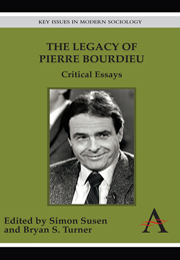Book contents
- Frontmatter
- Contents
- List of Contributors
- Introduction: Preliminary Reflections on the Legacy of Pierre Bourdieu
- 1 Between Structuralism and Theory of Practice: The Cultural Sociology of Pierre Bourdieu
- 2 Pierre Bourdieu: Unorthodox Marxist?
- 3 From Marx to Bourdieu: The Limits of the Structuralism of Practice
- 4 Durkheim and Bourdieu: The Common Plinth and its Cracks
- 5 With Weber Against Weber: In Conversation With Pierre Bourdieu
- 6 Bourdieu and Nietzsche: Taste as a Struggle
- 7 Elias and Bourdieu
- 8 Bourdieu and Adorno on the Transformation of Culture in Modern Society: Towards a Critical Theory of Cultural Production
- 9 The Grammar of an Ambivalence: On the Legacy of Pierre Bourdieu in the Critical Theory of Axel Honneth
- 10 Pierre Bourdieu and the Sociology of Religion
- 11 Bourdieu's Sociological Fiction: A Phenomenological Reading of Habitus
- 12 Overcoming Semiotic Structuralism: Language and Habitus in Bourdieu
- 13 Social Theory and Politics: Aron, Bourdieu and Passeron, and the Events of May 1968
- 14 Intellectual Critique and the Public Sphere: Between the Corporatism of the Universal and the Realpolitik of Reason
- 15 Practice as Temporalisation: Bourdieu and Economic Crisis
- Afterword: Concluding Reflections on the Legacy of Pierre Bourdieu
- Index of Names
- Index of Subjects
- Plate section
7 - Elias and Bourdieu
Published online by Cambridge University Press: 05 March 2012
- Frontmatter
- Contents
- List of Contributors
- Introduction: Preliminary Reflections on the Legacy of Pierre Bourdieu
- 1 Between Structuralism and Theory of Practice: The Cultural Sociology of Pierre Bourdieu
- 2 Pierre Bourdieu: Unorthodox Marxist?
- 3 From Marx to Bourdieu: The Limits of the Structuralism of Practice
- 4 Durkheim and Bourdieu: The Common Plinth and its Cracks
- 5 With Weber Against Weber: In Conversation With Pierre Bourdieu
- 6 Bourdieu and Nietzsche: Taste as a Struggle
- 7 Elias and Bourdieu
- 8 Bourdieu and Adorno on the Transformation of Culture in Modern Society: Towards a Critical Theory of Cultural Production
- 9 The Grammar of an Ambivalence: On the Legacy of Pierre Bourdieu in the Critical Theory of Axel Honneth
- 10 Pierre Bourdieu and the Sociology of Religion
- 11 Bourdieu's Sociological Fiction: A Phenomenological Reading of Habitus
- 12 Overcoming Semiotic Structuralism: Language and Habitus in Bourdieu
- 13 Social Theory and Politics: Aron, Bourdieu and Passeron, and the Events of May 1968
- 14 Intellectual Critique and the Public Sphere: Between the Corporatism of the Universal and the Realpolitik of Reason
- 15 Practice as Temporalisation: Bourdieu and Economic Crisis
- Afterword: Concluding Reflections on the Legacy of Pierre Bourdieu
- Index of Names
- Index of Subjects
- Plate section
Summary
The deeper one penetrates the universes of Norbert Elias and Pierre Bourdieu, the clearer it becomes: the similarities between their visions of society are striking. While the two sociologists always showed great sympathy for one another, there are no indications that they were fully aware of how fundamental the subterranean intellectual affinities were. And even though many social scientists combine a high regard for some of Elias's works with great admiration for several works by Bourdieu, thereby showing an instinctive sense of the affinities between these authors, until now it seems that no one has noticed the degree to which Bourdieu and Elias are intellectual siblings. The contributions of each has been highlighted in convincing work – in the case of Elias, for example, by Goudsblom (1987), and, in the case of Bourdieu, by the likes of Wacquant (2006). Even in such careful and judicious accounts, however, important connections between the two authors have remained either hidden or implicit. Engaging in some degree of excavation, this chapter brings to light why Bourdieu and Elias can be viewed as contributors to a single theoretical approach. The most important finding here is that both relied heavily on the same triad of core concepts, and both deployed those concepts in relentlessly relational and processual fashion. Our first goal, therefore, is to uncover these deep-seated conceptual affinities.
Our second goal is to demonstrate that, when taken together, the two authors' perspectives yield a vision more far-reaching and powerful than either considered separately.
- Type
- Chapter
- Information
- The Legacy of Pierre BourdieuCritical Essays, pp. 145 - 172Publisher: Anthem PressPrint publication year: 2011
- 6
- Cited by



